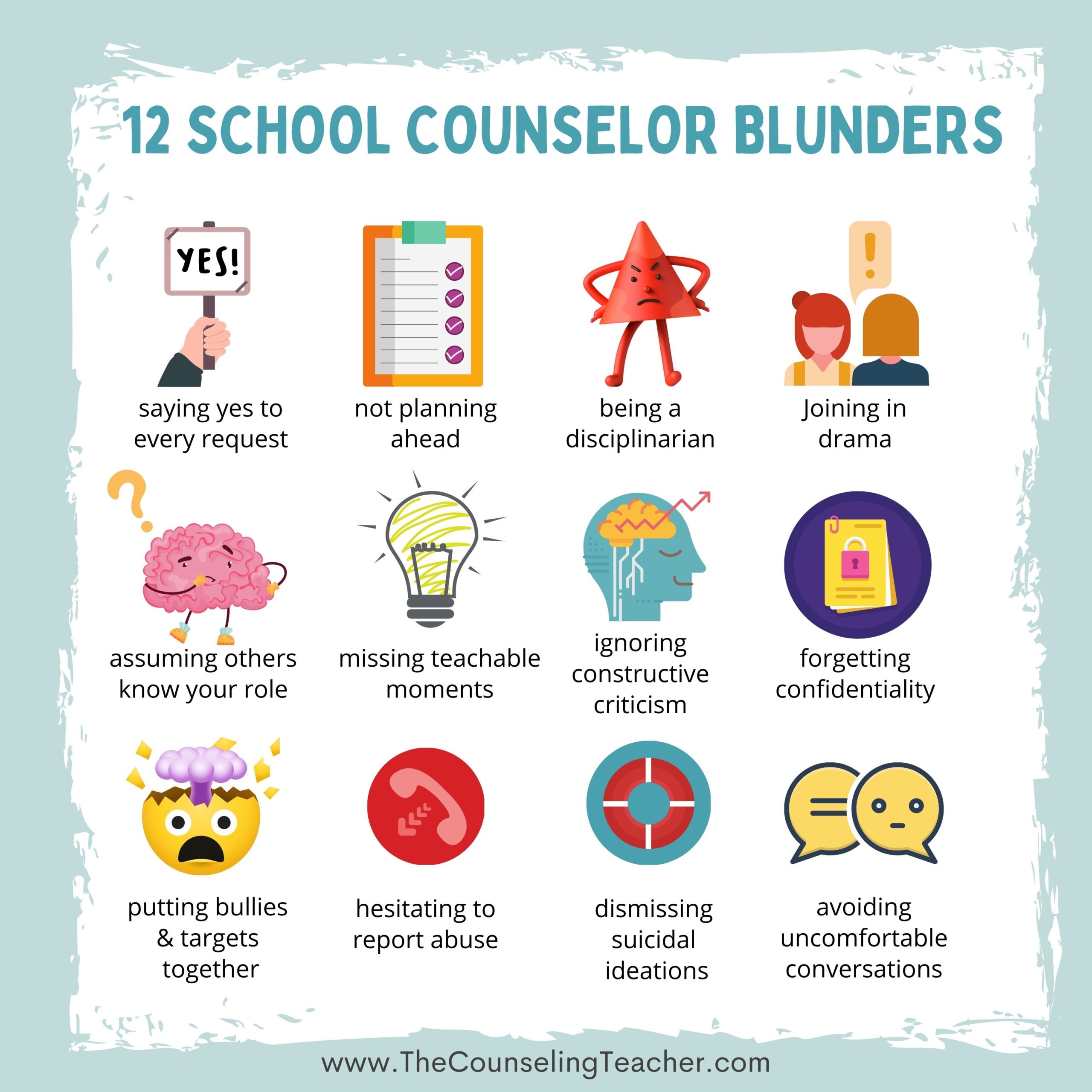 Whether you are a rookie or a seasoned counselor, there are certain pitfalls that must be avoided to run a successful School Counseling program. It’s exciting to step into your role as a school counselor and when you do, you want to make sure you don’t make any rookie counselor mistakes.
Whether you are a rookie or a seasoned counselor, there are certain pitfalls that must be avoided to run a successful School Counseling program. It’s exciting to step into your role as a school counselor and when you do, you want to make sure you don’t make any rookie counselor mistakes.
It seems like there’s always something to do and someone to meet (not to mention setting up your office and planning for the year).
But it’s essential to stay focused and keep your program within ASCA standards.
I’ve put together this list of common mistakes that new and some veteran counselors make, so you can avoid them like the plague.
1. It’s Ok to Say No
Many new counselors want to please everyone, it’s one of the most common rookie counselor mistakes. Even further into your career, you might find yourself in this situation again if you switch schools or have a new Principal.
Because it’s tempting to say yes to every request you get from coworkers. As the new kid on the block, some might think it’s easy to offload extra tasks on you. But you need the bandwidth to acclimate to your new gig, and to help your students.
So just say “no” when it’s just a little too much to handle. If you need more help with that, go check out these handy signs for a visual reminder.
Know your boundaries and stick to them!
2. Not Planning Ahead
As you begin your career as a school counselor, you’ll quickly discover that your schedule is full of things to do. Every year brings new challenges and those can take precedence over planning if you aren’t careful.
And if you don’t take time to plan out the essential things you need to accomplish for the year, something will likely take its place.
Take a day or two to focus on what can’t be missed, put those items in ink on your calendar, and plan around them going forward. (See School Counseling Planner)

3. Being a Disciplinarian
Some colleagues may think it’s your job to punish students when they aren’t performing the way they’d like them to. But never make the rookie counselor mistake and agree to be a disciplinarian.
Always remember that it’s your job is to be nonjudgemental, helpful, and to guide students to make better choices.
4. Assuming Everyone Knows Your Role
It might make you uncomfortable to remind staff and families of your role in their lives, but if you don’t, they may take advantage (or worse, not utilize) your skills.
To head this off, set up a display during parent night, ask to speak during parent teacher meetings or host a faculty info session every year to remind everyone how you can serve them best.
5. Joining the Workplace Drama
The teachers’ lounge is a place to relax and relate to your colleagues, but it’s also a hotspot for workplace scuttlebutt.
Getting wrapped up in the drama is never a good idea, but as a non-biased resource at your school, it’s even more important to detach yourself from gossip.
6. Missing Out on Opportunities to Help
Make every moment count!
It’s easy to get into a routine and miss those special teaching moments where you can spread positivity and teach.
And don’t forget to be on the lookout for opportunities to get to know your students and their families.
Consider sporting events, car duty, or other volunteering moments that might come your way.
7. Forgetting Confidentiality Rules
As you get to know your students and coworkers more intimately, slips-of-the-tongue can occur easier than you might think.
Always remind yourself, your coworkers, and students that what is said in your office. stays in your office (unless there’s a danger of harming oneself or others).
Place posters where both you and your visitors can see them and you’ll be less likely to make this mother-of-all rookie counselor mistakes.
8. Dismissing Suicidal Comments as Harmless
Even if a student sounds sarcastic or exclaims their suicidal tendencies jokingly, it’s your job to follow up with each occurrence.
Remind your students that you take what they’ve said very seriously, and you will investigate further.
9. Cornering Bullies and Targets in the Same Space
If you have a “bullying” situation, coworkers may suggest putting both students in the same room to “work out” the problem.
But as a trained counselor, you know that putting the students in the same room is a recipe for a disaster. The target will feel cornered and may clam up while the bully may take advantage of the situation.
10. Not Accepting Constructive Criticism
While you would love to be everyone’s favorite counselor, there will always be some negative feedback from students and colleagues. The trick is to first consider the input and decide if it can help you grow, and if not, dismiss it.
You never know if the criticizer is just having a bad day.
11. Failing to Report Due to Uncertainty
If you’re holding back on reporting something to child services because it feels as though there’s too much grey area, just default to reporting the problem.
You can leave the decision to follow-up to child services. It’s much worse to not report something, and it turns out to be the worst-case scenario than to err on the side of caution.
12. Looking the Other Way
You’re human, and sometimes the easiest way to deal with confrontation is to look the other way. But it’s your duty to have courageous conversations with adults and students who may not be following safety rules.
As a School Counselor, you’ll be looked to for support, leadership, and as a mediator. Wear your badge proudly and protect that image fiercely.


